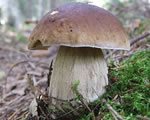 Go to main content
Go to main content
Archive Website of the UK government
Please note that this website has a UK government accesskeys system.
Main menu
Page menu
Newsroom

Poisons experts issue warning about wild mushroom foraging
- Published: Tuesday, 18 September 2023

The cep or penny bun (boletus edulis) is highly prized
As the autumn foraging season gets underway, a wild mushroom safety message has been issued by the Health Protection Agency's poisons experts.
Risk of poisoning
Wild food enthusiasts are being urged to take extra care when foraging for mushrooms because of the risk of picking toxic varieties, says the Health Protection Agency's (HPA) poisons experts.
Dozens of people seek medical advice each year after eating toxic varieties of wild mushroom which they have picked themselves. Some varieties which grow wild in the United Kingdom are so poisonous that they can be fatal if eaten. Foragers should remember that the poisons in some of the most dangerous wild mushrooms are generally not destroyed by cooking.
Last year there were 257 cases of poisoning linked to eating mushrooms.
Dr John Cooper of the HPA said: "People heading out to gather wild food this autumn should be aware of the dangers. Correctly identifying the mushrooms that are safe to pick and eat is key in ensuring that foraging is good fun and does not become a danger to your health."
Foraging dos and don'ts
The Food Standards Agency has issued advice for wild food foragers:
- do make sure you can identify what you've found - use several features (check leaf, flower, berry colour and shape, season, and so on). If you're unsure, don't eat it
- do wash your harvest well, wherever you have collected it
- do keep a sliver of mushroom, berry or leaf aside so it can later be identified if you do have a stomach upset
- don't allow children to pick or eat wild food unsupervised
- don't eat an unhealthy looking plant or fruit – if it appears burnt, bruised or has any sign of mould, for example
- don't eat plants and berries growing on old industrial sites, busy roadside verges or where the ground is visibly contaminated with oil or ash
- if you go foraging, only take what you need so that there is enough of the plant left to reproduce
- it is illegal to uproot any wild plant without the permission of the owner or occupier of the land
 Facebook
Facebook Twitter
Twitter StumbleUpon
StumbleUpon Delicious
Delicious Reddit
Reddit
